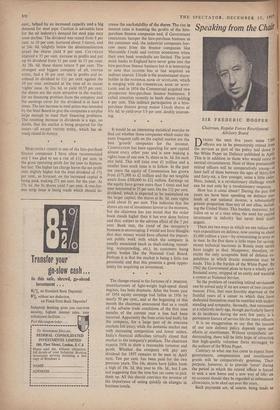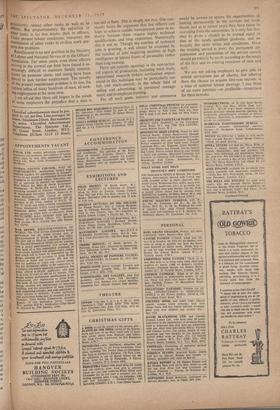it
Speaking from the Cha
SIR FREDERIC HOOPER Chairman, Regular Forces Resettlement Advisory Board DURING the next five years some 7,000 officers are to be prematurely retired from the services as part of the policy laid down in the White Paper on Defence published in April• This is in addition to those who would retire ill normal circumstances. Most of these prematurely retired officers will be comparatively young—at least half of them between the ages of thirty-five and forty-six, a few younger, some a little older. Here, indeed, is a revolutionary challenge which can be met only by a revolutionary response.
How has it come about? During the past five years we have been spending on defence one' tenth of our national income, a substant allY greater proportion than any of our allies, includ- ing the United States. This burden, moreover, has fallen on us at a time when the need for capital investment in industry has never been more urgent.
There are two ways in which we can reduce our vast expenditure on defence, now costing us about £1,600 million a year—by economising in arms or in men. In the first there is little room for saving; recent technical successes in Russia must surely have taught us that. Manpower, therefore, re- mains the only acceptable field of defence ex- penditure in which drastic economies may be made. This is the burden of the White Paper BY 1962 the Government plans to have a wholly pro- fessional army, stripped of so costly and wasteful a system as National Service.
So the problem of resettling retired servicemen can be solved only if we are aware of two circum- stances. First, that men forcibly deprived of the fruitful years of a career to which they 1. aye dedicated themselves must be resettled with under- standing and sympathy. Secondly, that retirement at a relatively early age, though particularly heavy in its incidence during the next few years, is a permanent feature of service life for many officers.
It is no exaggeration to say that the success Of our new defence policy depends upon our efforts at resettlement. Without sympathetic un- derstanding, there will .be little hope of attracting that high-quality volunteer force envisaged by the authors of the White Paper.
Contrary to what one has come to expect from governments, compensation and resettlement grants will be comparatively generous. Their purpose, however, is to provide 'cover' during 'the period in which the retired officer is forced to seek a new home and a new way of life; on no account should they be regarded as subsistence allowances, to be eked out over the years.
Such payments are, of course, being made to 0 0
0 0 r S
ternaturely retired other ranks as well as to kers. But proportionately the reduction in titer ranks is far less drastic than in officers. Inder present labour conditions, moreover, the :settlement of other ranks in civilian work pre- :nts few problems. Resettlement is no new problem to the Ministry f labour and National Service or to the Officers' Association. For some years, even those officers :tiring at the normal age limit have found it in- creasingly difficult to maintain family commit- ments on pensions alone, and manx. have been )reed to seek further employment. The novelty f the present resettlement problem is its size, the fdden influx of many hundreds of men, all seek- 18 employment at the same time.
I am afraid that there still lingers in the minds some employers the prejudice that a man is
0 C
too old at forty. This is simply not true. One con- stantly hears the argument that few officers can hope to achieve middle management posts in in- dustry because these require highly technical qualifications and long experience. Numerically this is not so. Though the number of technical jobs is growing, it will always be exceeded by the number of jobs requiring qualities of high intelligence or special facets of personality rather than long training. There arc suitable openings in the non-techni- cal aspects of production, including work study, operational research (where servicemen experi- enced in this technique may be particularly use- ful) and stock-control; in the whole field of selling and advertising; in personnel manage- ment; and in employee training. For all such posts, industry and commerce would be unwise to ignore the opportunities of looking permanently to the services for fresh blood, just as in recent years they have taken to recruiting from the universities. It is only fair that they be given a chance to be trained equal to that of the newly qualified graduate, and on broadly the same terms and conditions. Once the training period is over, the permanent ap- pointment and promotion of the service recruit should go entirely by mi.srit according to the needs of the firm and its existing resources of men and skill.
We arc not asking employers to give jobs to retired servicemen out of charity, but offering them the chance to acquire first-rate recruits at a time of national labour shortage. I can think of no more patriotic-or profitable-investment for them to make.







































 Previous page
Previous page